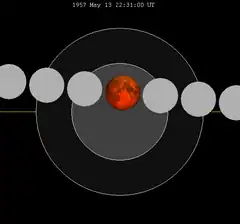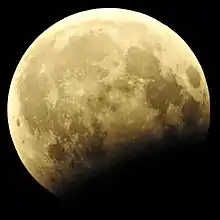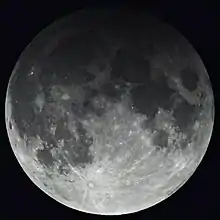June 1955 lunar eclipse
A penumbral lunar eclipse took place at the Moon's ascending of the orbit on Sunday, June 5, 1955, with a penumbral eclipse magnitude of 0.62181 (62.181%). A penumbral lunar eclipse takes place when the Moon moves through the faint, outer part of Earth's shadow, the penumbra. This type of eclipse is not as dramatic as other types of lunar eclipses and is often mistaken for a regular Full Moon. The Moon shines because its surface reflects the Sun's rays. A lunar eclipse happens when the Earth comes between the Sun and the Moon and blocks some or all of the Sun's light from reaching the Moon. A penumbral lunar eclipse occurs when the Sun, Earth, and the Moon are imperfectly aligned. When this happens, the Earth blocks some of the Sun's light from directly reaching the Moon's surface and covers all or part of the Moon with the outer part of its shadow, also known as the penumbra. Since the penumbra is much fainter than the dark core of the Earth's shadow, the umbra, a penumbral eclipse of the Moon is often difficult to tell apart from a normal Full Moon. Occurring only 0.5 days after apogee (Apogee on June 5, 1955), the moon's apparent diameter was 6.5% smaller than average (1888 arcseconds).[1]

Visibility
The penumbral eclipse was visible in Asia, Australia, Pacific, seen rising over Africa/western Indian Ocean and setting over the Pacific.

Related lunar eclipses
Lunar year series
| Ascending node | Descending node | |||||
|---|---|---|---|---|---|---|
| Saros | Date Viewing |
Type Chart |
Saros | Date Viewing |
Type Chart | |
| 110 | 1955 Jun 5 |
Penumbral |
115 | 1955 Nov 29 |
Partial | |
| 120 | 1956 May 24 |
Partial |
125 | 1956 Nov 18 |
Total | |
| 130 | 1957 May 13 |
Total |
135 | 1957 Nov 7 |
Total | |
| 140 | 1958 May 3 |
Partial |
145 | 1958 Oct 27 |
Penumbral | |
| Last set | 1954 Jul 16 | Last set | 1955 Jan 8 | |||
| Next set | 1958 Apr 4 | Next set | 1959 Sep 17 | |||
Half-Saros cycle
A lunar eclipse will be preceded and followed by solar eclipses by 9 years and 5.5 days (a half saros).[2] This lunar eclipse is related to two partial solar eclipses of Solar Saros 117.
| May 30, 1946 | June 10, 1964 |
|---|---|
 |
 |
Notes
- Hermit Eclipse: Saros cycle 110
- Mathematical Astronomy Morsels, Jean Meeus, p.110, Chapter 18, The half-saros

_(cropped).jpg.webp)
